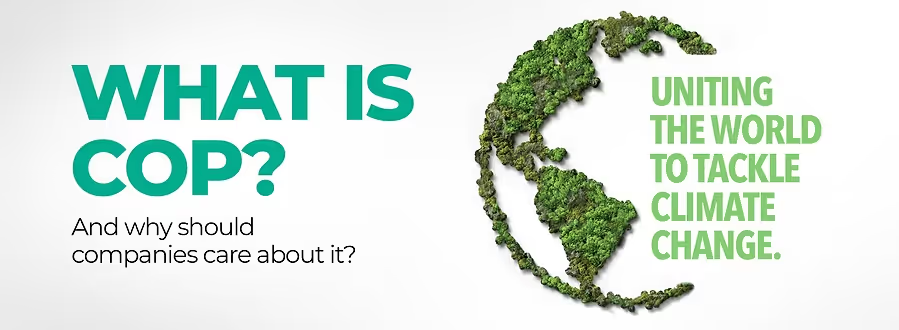
Solutions
Carbon Management
ESG Intelligence
Climate & Nature Risk
Data Registry
Beta
Sector
Get started, schedule a demo or request a free assessment!


StepChange Primer. Sidhant Pai, Chief Science Officer, StepChange Inc.
StepChange Primers provide brief overviews of important subjects in corporate sustainability. Follow us to receive notifications on future content.
A short primer on the conference of parties scheduled to start this Sunday.
Climate change is one of the most important societal challenges that we will reckon with over the next century. However, the incredible scale of this global problem, and the competing interests of the different stakeholders, have made it exceedingly difficult for the international community to agree and commit to a set of concrete solutions for climate mitigation, adaptation or resilience at any meaningful scale.
In order to align and catalyse global action, it is thus increasingly vital to invest in international coordination and institutional programming that can facilitate collective stakeholder action and disseminate shared learnings to the interested actors.
The ‘Conference of the Parties to the United Nations Framework Convention on
Climate Change’, or COP, is perhaps the preeminent example of such an effort. It is an international event organised to help countries and their internal stakeholders structure, negotiate, track and update their efforts to tackle climate change. In addition to the heads of state and senior government officials that convene at the COP, the event and the associated climate-related programming are attended by hundreds of other delegates - including non-governmental representatives, climate advocates, earth scientists, policy experts and corporate leaders.
This year marks the 27th such COP, set to officially start on the 6th of November in Sharm el-Sheikh, Egypt.
The COP is an important event because it brings together a diverse group of
stakeholders, with deep expertise in different fields, and structures their interactions under the unifying aim of reaching a consensus on how to tackle climate change.
This also involves detailed discussions and knowledge sharing on important issues like industrial decarbonization, sustainable finance, clean energy, green land use, etc. It also serves as a valuable check-in for representatives from the participating countries to update or adjust their national action plans (‘nationally determined contributions’) to decarbonize their economies. Non-governmental actors from the scientific, non-profit and business communities are similarly invited to share and discuss the progress they and others have made towards the broader decarbonization of our society (stay tuned for a future blog post on this subject!) via a number of ancillary events.
While most discussions related to the COP tend to focus on multilateral
governmental dynamics and national commitments, the event is also an incredible opportunity for forward-looking companies to understand, process and contribute to the discussions around corporate sustainability and responsible business.
While sometimes criticised as being more talk than action, this upcoming COP could be a catalysing event for individual businesses that are looking to get ahead of the game and decarbonize their operations and supply chains. In particular, businesses should pay attention to the conversations around:
Shifting Regulatory Outlooks: As governments update their commitments, announce new pledges, and take steps to regulate their economies, companies would benefit greatly from paying attention to how regulatory changes might impact their operations in the coming years.
Infrastructure Investments: Governmental commitments to sustainable infrastructure, renewable energy and green technologies could lead to the creation of entirely new markets and business opportunities in the coming decade. Companies would benefit from analysing how to best position themselves to leverage this new infrastructure and create long-term value for their clients.
Technology Development: Governmental and non-governmental presentations and disclosures around next-generation solutions for energy production, efficiency optimisation, electrification, carbon capture, etc. could unlock operating models that have been prohibitively expensive or difficult to implement thus far. Companies would also greatly benefit from an understanding of how the widespread adoption of such technologies over the coming decade might impact their existing businesses.
Evolving Standards and Expectations: As companies look internally to set net-zero
goals and make corporate decarbonisation commitments, they will be well-served by a strong understanding of the tools, standards and best practices available to them in this transition. Given the sector-specific nature of such standards, and the rising demands for upstream sustainability, companies that are interested in mitigating their transitional risk will need to stay abreast of industry-specific carbon intensity levels and act on cues to develop competitive sustainability practices internally.
Green Finance: The influx of private and public-sector capital that is earmarked for
a sustainable and responsible business will likely lead to increasingly attractive capital opportunities for corporations looking to decarbonize their operations and fund new expansions into green verticals.
Collaborative Opportunities: The COP will have an incredibly dense number of
subject-matter-experts that are passionate about climate solutions and have deep expertise in their respective domains. It is thus an opportunity for corporations to contribute to and benefit from targeted thought leadership in the space while exploring opportunities for collaborative positive-sum projects that align their industries without disproportionately impacting individual actors.
All things considered, COP27 (and the associated programming) is an incredible
opportunity for savvy corporate observers to take a pulse of the current state of the global climate effort, make meaningful climate commitments of their own, and set their companies up to succeed in the rapidly evolving sustainability-focused business environment over the coming decades.
StepChange is a climate-tech startup that helps companies and brands accelerate their sustainability journey and transition to NetZero. Learn how we may be able to help your organisation through our website or simply follow us on LinkedIn to stay tuned!
To share this article, use the social icons below:

.svg)